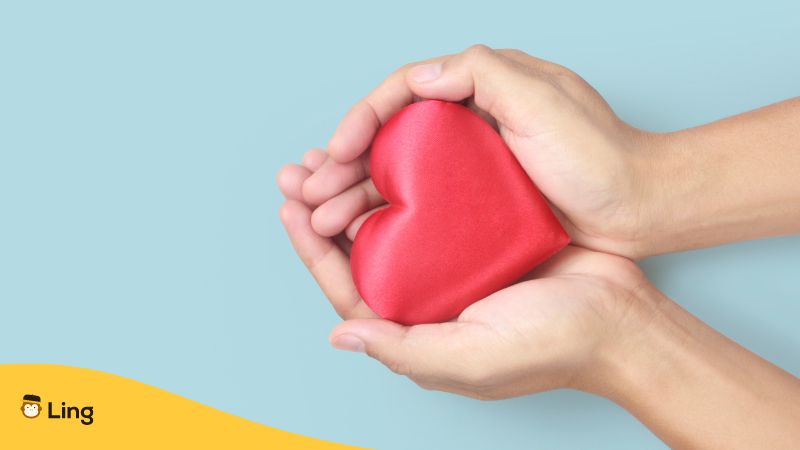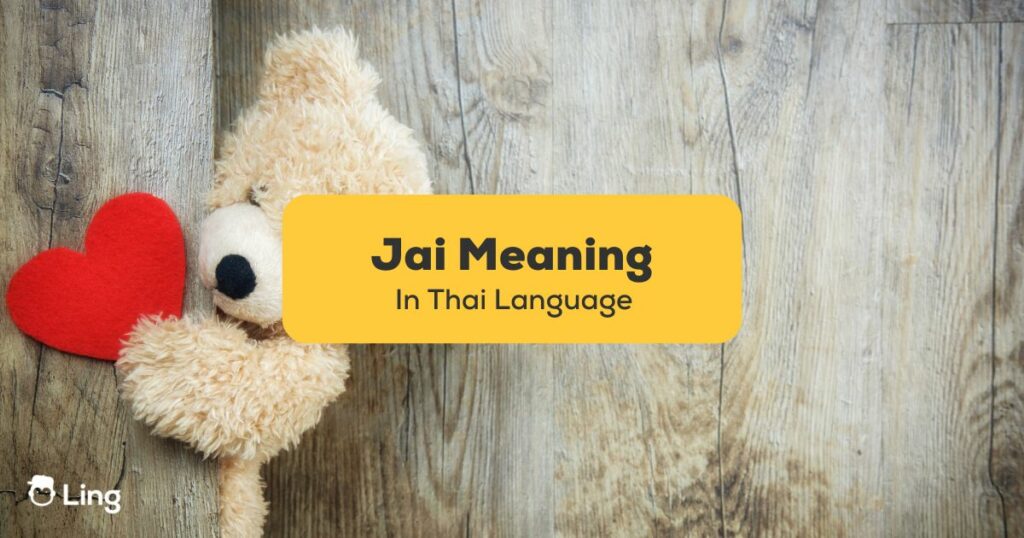The word jai or ใจ (cay) is one of the most important words in the Thai language. It’s, quite literally, the center of many Thai words, particularly adjectives. But do you know what the word means?
In this article, we’ll be learning some Thai words, and of course, finding out what the title says. So without further ado, let’s explore some jai words, or should I say, heart words.
Jai Meaning In Thai
Below are some words that’ll best describe the jai meaning in Thai. Let’s check them out!
“Heart” In Thai: ใจ (Cay)
The word ใจ (cay) literally translates to “heart” in Thai. But I’m not just talking about one’s heart, the physical organ that each and every one of us has. The meaning of ใจ (cay) goes way beyond that, extending to emotions, intentions, and moral character as well.
We all know that Thai society is one that is largely Buddhist and spiritual. As such, the word ใจ (cay) holds great significance in the everyday lives of Thai people. After all, the heart is seen as the center of the human body that reflects our inner being, the workings of our mind, spirit, and soul in Thai culture.
As the center of our being, it is believed that the heart is integral to the concepts of spiritual development and enlightenment in Buddhism. This is probably why ใจ (cay) is such an important word that appears in so many Thai words.

“Kind-Hearted” In Thai: ใจดี (Caydii)
This is a word that Thai people use a lot, so I’m sure you’ve heard of it before. The word ใจดี (caydii), pronounced as “jai dee”, means to “be kind-hearted”, or to “have a good heart”.
Separately, the word ใจ (cay) means “heart” as you already know, while the word ดี (dii) means to “be good”. So if you want to talk about a nice or generous person who you have good feelings about, you can use the word ใจดี (caydii) to refer to them.
“Cool Heart” In Thai: ใจเย็น (Cayyen)
If you watch lots of Thai series, I’m sure you’re no stranger to the word ใจเย็น (cayyen) or jai yen. It literally means “cool heart” and can be used to describe a person who’s calm, composed, and level-headed. However, I’d say it’s more often used differently.
The word ใจเย็น (cayyen) can also mean “to keep calm” or “to calm down”, which you probably can already guess if you follow Thai shows. After all, it’s the word that characters would use to get their angry, agitated, or emotional friend or family member to calm down.
The two most common ways Thais would use this word is ใจเย็นๆ (cayyenyen), which still means “to calm down” but with more emphasis, and ใจเย็นก่อน (cayyen kɔ̀ɔn), which means “to calm down first”. It’s perfect if you want to help someone get over their fear and get them to breathe normally.
Of course, the word ใจเย็น (cayyen) doesn’t always have to be used in this context. You can also use it to reassure someone, to tell them to take it easy and don’t stress out too much.
“Hot Heart” In Thai: ใจร้อน (Cayrɔ́ɔn)
When there’s cold, there’s hot. That’s why you probably wouldn’t be that surprised to know that the word ใจร้อน (cayrɔ́ɔn) or jai ron, which literally means “hot heart” and is the polar opposite of ใจเย็น (cayyen), is a thing in Thai as well.
As it suggests, the word ใจร้อน (cayrɔ́ɔn) can be used to describe somebody who’s hot-headed, temperamental, and stubborn. In more drastic cases, it can also be used to refer to a person in a more negative manner, like someone who’s narrow minded, hard hearted, or even impatient.
However, the word ใจร้อน (cayrɔ́ɔn) isn’t usually used to that extent. It typically just means that someone has a bit of a temper and may not be too considerate about others, but definitely not someone who’s heartless or selfish.
“Heart” In Thai: หัวใจ (Hǔacay)
Now, you may be wondering, what’s the difference between ใจ (cay) and หัวใจ (hǔacay)? They both mean “heart” don’t they? No worries, I was confused myself as well, and even some Thais aren’t quite sure why they’re not the same!
While ใจ (cay) refers to “heart” in a broader sense that encompasses both emotions and thoughts, the word หัวใจ (hǔacay) refers more specifically to the physical organ in the human body. The word หัว (hǔa) translates to “head” or “core”, while ใจ (cay) means “heart”, as we already know. Put together, it makes หัวใจ (hǔacay) or hua jai.
There’s no doubt that ใจ (cay) is used more often than หัวใจ (hǔacay) since it’s broader and more general, but that doesn’t mean หัวใจ (hǔacay) doesn’t appear anywhere at all! In fact, it’s in the title of a recent popular Thai series, Dangerous Romance or หัวใจในสายลม (hǔacay nay sǎay lom).
Now, this show’s English name may be simple, but its Thai one is much more poetic. It translates to “heart in the wind”. How beautiful is that?

In A Nutshell: ใจ (Cay)
If you have Thai friends, I’m sure you’ve heard them use a Thai word or two with the word ใจ (cay) in it. And now that you know how prevalent the word is in Thai, I don’t think you’ll feel surprised by how often it comes up in daily conversations.
In fact, the word ใจ (cay) does’t just appear in everyday lives. If you listen to Thai pop or T-pop, you’ve probably noticed that it comes up in lots of Thai songs as well, be it by itself or as an adjective.
One of them includes Thai band Tilly Birds and Thai rapper MILLI’s “Just Being Friendly” or เพื่อนเล่น ไม่เล่นเพื่อน (phʉ̂anlên mây lênphʉ̂an) which I mentioned in my article about Poetic Thai Words.
- ใจเธอ คิดเหมือนกันหรือเปล่า (cay thəə khít mʉ̌ankan rʉ̌ʉplàaw) Do you feel and the way I feel?
- เจอแบบนี้ไป ฉันแอบเผลอ (cəə bɛ̀ɛp níi pay chǎn ɛ̀ɛp phlə̌ə)Though one-sided,
- ใจให้ไปแม้มันไม่อาจเป็นจริง (cay hây pay mɛ́ɛ man mây àat penciŋ)My feelings are getting too real
Of course, this isn’t the only song that features the word ใจ (cay). Other instances include Thai actors Off Jumpol and Gun Atthaphan’s “My Side” or เข้าข้างตัวเอง (khâwkhâaŋ tuaeeŋ), the theme song of their hit TV series “Not Me” or เขา…ไม่ใช่ผม (khǎw … mâychây phǒm).
- มันเกิดอะไรกับใจข้างในมันไหวหวั่น (man kə̀ət àray kàp cay khâaŋnay man wǎy wàn) What is happening inside, I’m shaken
- ที่เจอหน้ากันทุกวัน นั้นมันไม่เหมือนเดิม (thîi cəə nâa kan thúkwan nán man mây mʉ̌andəəm) Seeing you every day has become different
- ชอบคิดเข้าข้างตัวเอง (chɔ̂ɔp khít khâwkhâaŋ tuaeeŋ) I’m taking my own side
- ว่าเพลงที่เธอเปิดฟัง เธอเปิดให้ฉัน ทุกที (wâa phleeŋ thîi thəə pə̀ət faŋ thəə pə̀ət hây chǎn thúkthii) Thinking every song you put on is for me
It even appears not once, not twice, but more than three times in Thai singer and actor Billkin’s song “Always” or ยิ้มทั้งน้ำตา (yím tháŋ náamtaa), a heartbreaking song about coming to terms with the end of a bittersweet relationship.
- ถึงผ่านมาแล้ว (thʉ̌ŋ phàan maa lɛ́ɛw) Even though it has passed,
- ไม่มีวันผ่านไปอยู่ในนี้ (mâymiiwan phàan pay yùu nay níi) But in here it lasts.
- เสียงที่เธอบอกรักกันมันยังดังข้างในใจ (sǐaŋ thîi thəə kràk kan man yaŋ daŋ khâaŋnay cay) The sound of your voice saying you love me still rings loud in my heart.
Learn The Thai Language With Ling
Of course, the word ใจ (cay) appears in many words about emotions and feeling in Thai. Here are a few examples: ริงใจ (ciŋcay), มั่นใจ (mâncay), พอใจ (phɔɔcay), เสียใจ (sǐacay), ตั้งใจ (tâŋcay), and much more. If you want to learn more, then you should definitely download the Ling app.
With the Ling app, you can learn a phrase and practice speaking right after. Every example comes with their meanings, and if you can translate and have the app explain the sentence to you if you’re not sure. Trust me, it’ll come in handy should you decide to travel the world one day, starting with Thailand.
So, what are you waiting for? Put your ใจ (cay) into learning Thai with the Ling app today! Visit Google Play Store or App Store now!



































































